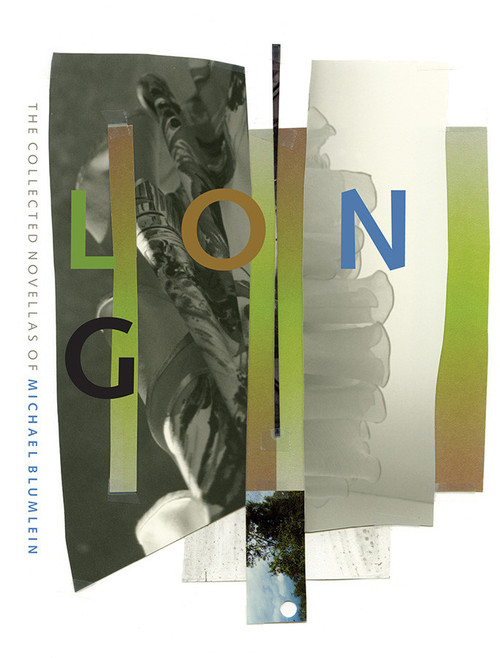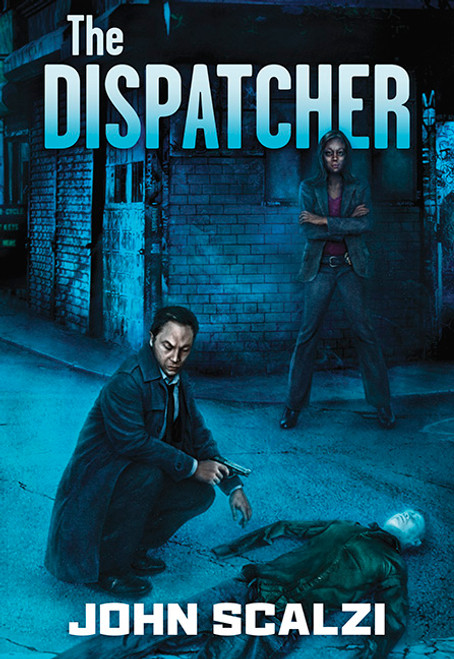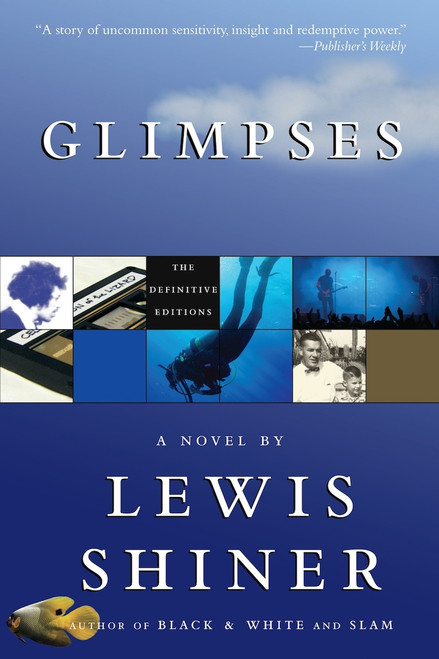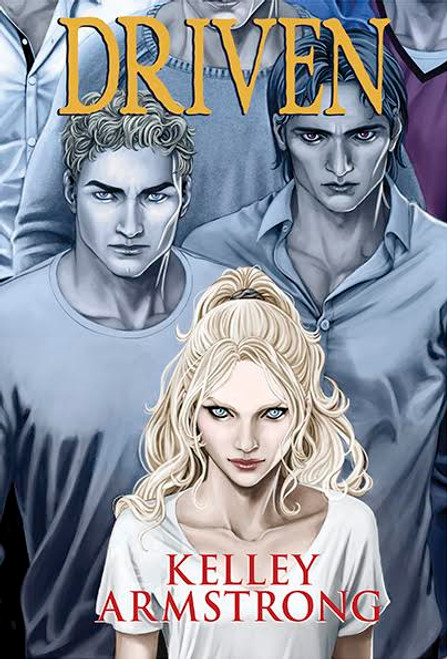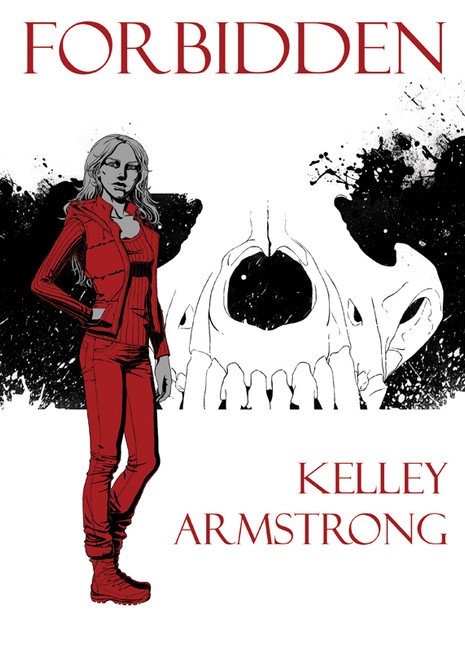Cover illustration by Ted Naifeh
An albino girl wanders the sun-scorched backroads of a south Georgia summer, following the bidding of an angel or perhaps only voices in her head, searching out and slaying ancient monsters who have hidden themselves away in the lonely places of the world. Caitlín R. Kiernan first introduced Dancy in the pages of her award-winning second novel, Threshold (2001), then went on to write several more short stories and a novella about this unlikely heroine, each a piece of what has become an epic dark fantasy narrative. Alabaster finally collects all these tales into one volume, illustrated by Ted Naifeh (Gloomcookie, How Loathsome, Courtney Crumrin, Polly and the Pirates, etc.).
Table of Contents:
- Introduction
- The Well of Stars and Shadow
- Alabaster
- Waycross
- "Le Fleurs Empoisonnées" (originally published as In the Garden of Poisonous Flowers)
- Highway 97
- Bainbridge
From Gahan Wilson, in Realms of Fantasy Magazine:
"There’s no one quite like her in folding and unfolding characters in a sort of origami fashion so that they surprise you again and again, but always logically no matter how bizarrely; there are very few who can transport you via deft, strange spells from scene to scene as smoothly and gracefully, sliding open secret panels, turning reliable-seeming staircases into carnival slides, and dropping you suddenly through trap doors."
From Publishers Weekly:
“Dancy Flammarion, an albino adolescent who speaks to angels and slays monsters in human guise in the backwoods of contemporary Georgia, is the heroine of the five interlocking stories that make up this eerie dark fantasy collection... Kiernan imbues the tales with disquieting gothic imagery and envelops them in rich, evocative prose that conveys cohesiveness beyond their fragmentary plots.”
From Locus Magazine:
"Dancy stands, a bit uncomfortably, in a long line of monster-hunting characters, walking the Earth and dispatching creatures of ancient evil, but Kiernan twists the conventions hard. First, Dancy is young, naive about human society (having grown up isolated in a Florida swamp), and visited often by a terrifying angel. She gets no satisfaction out of killing monsters. First, she killed to survive. Later, she killed because it seemed the only life open to her, and because her angel would not permit her to do otherwise. It's not a question of duty, or responsibility, but of necessity. She is more Joan of Arc than Solomon Kane... "Bainbridge," an original novelette, is a tour de force, alternating three storylines: Dancy's assault on a desecrated church that houses monsters; the story of Dancy's mother and her youthful attempt to commit suicide to escape the demands of her own angel; and sections set in the dark fantasy otherworld of Kiernan's novel Murder of Angels, which obliquely relates to the other threads.
"It might seem a bit early to review a book not due until September, but I hear the $45 limited edition -- which will include a chapbook with a new story -- is close to selling out, so pre-order while you can. Ted Naifeh's illustrations are suitably creepy, and his wraparound cover, Dancy, alone, menaced by monsters -- is marvelous."
From Booklist:
"Kiernan's richly evocative prose vividly portrays her twisted characters as well as it illustrates their eerie, kudzu-infested, Deep South surroundings."
From Bookslut:
"With her latest collection, Caitlin Kiernan proves that she knows how to write a damn fine story about the scariest parts of everything that lives and breathes down those long dark southern roads... Kiernan makes us see just how painful a job it is for her teenage hero, just how ugly and nasty being a savior can be."
Alabaster
(excerpts)
Preface
I cannot now recall where or when or why I first conceived of Dancy Flammarion. But then I can say the same thing about almost all of my characters, regardless of how fond of them I may (or may not) be. Almost inevitably, that moment when they initially occur to me is lost. Only later, after a story or two, after a novel or three, do those original thoughts take on any significance, and by then it’s too late and I’ve forgotten. Hindsight’s a bitch.
But the earliest mention of Dancy in my notes for Threshold is dated September 16th, 1998. I describe her simply as a “creepy little ‘Boo Radley’ albino girl.” Also, I know that I first came across the name Dancy that summer, while I was collecting fossils from the Upper Cretaceous of western Alabama. If you look at a map of the state – if you look very closely – you can probably find the “town” of Dancy on State Highway 17, a few miles east of the Mississippi state line in southern Pickens County. It had a post office, once upon a time, and might have been named for Dr. Edwin C. Dancy (b. 1810). I was there one blistering afternoon in July or August, and the name stuck in my head, as names often do, and so maybe it’s fair to say that’s where Dancy Flammarion began.
Les Fleurs Empoisonnées
Miles past a town named Vidalia, town named after an onion, onion named after a town, but Dead Girl has no idea how many miles, the vast, unremarkable Georgia night like a seamless quilt of stars and kudzu vines and all these roads look the same to her. The Bailiff behind the wheel of the rusty black Monte Carlo they picked up in Jacksonville after the Oldsmobile broke down, Bobby in the front seat beside him, playing with the dials on the radio; the endless chain of honky-tonk and gospel stations is broken only by the spit and crackle of static squeezed in between. Dead Girl’s alone in the backseat reading one of her books by moonlight. She asks Bobby to stop, please, because he’s getting on her nerves, probably getting on the Bailiff’s nerves, too. He pauses long enough to glance back at her, and his silver eyes flash like mercury and rainwater coins. He might be any six-year-old boy, except for those eyes.
The Well of Stars and Shadow
Through the deepening slash-pine shadows, the dim and fading shafts of twilight falling pale through the high branches of Shrove Wood, and Dancy Flammarion follows the familiar twists and turns of Wampee Creek. The cinnamon ferns and saw palmetto grown waist high to an eight-year-old, under-story carpet of rust fronds and emerald-sharp leaves, and she watches the uneven ground, mindful where she puts her feet, watching for snakes and steel-jawed traps laid among the pine straw. Traps set for raccoon and bob-cats, but they’re just as happy to snap shut on little girl ankles, even this strange albino child who can only go out to play when the sun turns fat and red and sinks slow into the swamp.
Waycross
“Rise and shine, Snow White,” the Gynander growls, and so the albino girl slowly opens her pink eyes, the dream of her dead mother and sun-light and the sheltering sky dissolving to the bare earth and meat-rot stink of the cellar.
Go back to sleep, and I’ll be home again, she thinks. Close my eyes, and none of this has ever happened. Not the truth, nothing like the truth, but cold comfort better than no comfort at all in this hole behind the place where the mon-ster sleeps during the day. Dancy blinks at the darkness, licks her dry, chapped lips, and tries hard to remember the story her mother was telling her in the dream. Lion’s den, whale belly, fiery-furnace Bible story, but all the words and names running to-geth-er in her head, the pain and numbness in her wrists and ankles more real, and the dream growing smaller and farther away with every beat of her heart.
The red thing crouched somewhere at the other side of the cellar makes a soft, wet sound and strikes a match to light the hurricane lamp gripped in the long, raw fingers of its left hand. Dancy closes her eyes, be-cause the angel has warned her never to look at its face until after it puts on one of the skins hanging from the rusted steel hooks set into the ceiling of the cellar. All those blind and shriveled hides like de-flat-ed people, deflated animals, and it has promised Dancy that some day very soon she’ll hang there, too, one more hollow face, one more mask for it to wear.
Alabaster
The albino girl, whose name is Dancy Flammarion, has walked a long way since the fire in Bainbridge, five nights ago. It rained all morning long, and the blue-grey clouds are still hanging sullen and low above the pines, obscuring the wide south Georgia sky. But she’s grateful for the clouds, for anything that hides her from the blistering June sun. She’s already thanked both St. George and St. Anthony the Abbott for sending her the clouds, because her grandmother taught her they were the patron saints of people suffering from skin diseases. Her grandmother taught her lots of things. The damp air smells like pine straw and the fat white toadstools growing along the side of the highway. Dancy knows not to eat those, not ever, no matter how hungry she gets. Her grandmother taught her about toadstools, too.
She stops, shifting the weight of her heavy old duffel bag from one shoulder to the other, the duffel bag and the black umbrella tied to it with hemp twine, and looks back the way she’s just come. Sometimes it’s hard to tell if the voices she hears are only inside her head or if they’re coming from somewhere else. The highway glistens dark and wet and rough, like a cottonmouth moccasin that’s just crawled out of the water. But there’s no one and nothing back there that she can see, no one who might have spoken her name, so Dancy turns around and starts walking again.
Bainbridge
Only a few miles south and west of the sleeping city of electric lights and sensible paved streets, where a crooked red-clay road ends finally before nettle thickets and impassable cypress swamps leading away through the night to the twisting, marshy banks of the Flint River, sits the ruined husk of Grace Ebeneezer Baptist Church. Erected sometime late in 1889 by two freed slaves from Alabama, forsaken now by any Christian congregation for more than two decades, it has become another sort of sanctuary. Four straight white walls, no longer precisely white nor standing precisely straight, rise from a crumbling foundation of Ocala Limestone to brace the sagging gray roof, most of its tar-paper shingles lost over the years to summer gales and autumn storms. In places, the roof has collapsed entirely, open wounds to expose decaying pine struts and ridge beams, to let in the rain and falling leaves and the birds and squirrels that have built their nests in the rafters. Here and there, the holes go straight on through the attic floor, and on nights when the moon is bright, clean white shafts fall on the old pews and rotting hymnals. But this night there is no moon. This night there are only low black clouds and heat lightning, a persistent, distant rumble somewhere to the north of Dry Creek Road, and Dancy Flammarion stands alone on the cinderblock steps leading up to the wide front doors of the church.
There are two dozen or more symbols drawn on the weathered doors in what looks like colored chalk and charcoal. She recognizes some of them, the one’s that the angel has warned her about or that Dancy learned from her grandmother before she died – an Egyptian Eye of Horus and something that looks like a letter H but she knows is really the rune Hagal, a pentagram, an open, watchful eye drawn inside a triangle, a circle with a fish at its center. They’re all there for the same reason, to keep her out, to keep whatever’s hiding inside safe, as if she were the monster.
Highway 97
It’s two or three hours past midnight, but still long hours left until dawn, and the albino girl is beginning to get sleepy. She’s been walking since sunset, almost always walking at night to avoid the blistering, unblinking white eye of the summer sun, and her shoulder has finally stopped aching and gone numb from the constant weight of her duffel bag and the black umbrella tied onto it. She stops and lets the worn canvas bag, which once belonged to her grandfather, slide off her shoulder and into the weeds and gravel at the side of the road. Even this late, she can still smell the asphalt cooling down and wonders if it’ll be hard again before morning and the next day’s heat. She can also smell the pine and bald cypress trees pressing in close on either side, and stagnant, swampy water, and her own sweat, and something sickly sweet that she thinks might be magnolia blossoms.
The moon is only a few nights past full, and the sky is filled with the cold white fire of stars, so it’s not so very dark, and she glances back the way she’s come to see if the shaggy black dog’s still following her. It is, still walking right down the middle of the highway on its long legs like dogs never get run over by trucks and cars. If she stands here very long, it’ll catch up with her again, and she doesn’t want to talk to it anymore, doesn’t want to hear the things it has to say. The last couple of miles, it’s been singing hymns, mostly “Nearer My God to Thee,” over and over and over again. Sometimes it gets all the words right, and sometimes it makes up its own words, and some other times it just hums.
- artists_list:
- Ted Naifeh
- authors_list:
- Caitlin R. Kiernan
- book_edition:
- ebook
- book_type:
- Collection
- isbn:
- 978-1-64524-024-2
- is_subpress:
- Yes
- print_status:
- Digital
- year:
- 2020
- badge:
- eBook Edition




